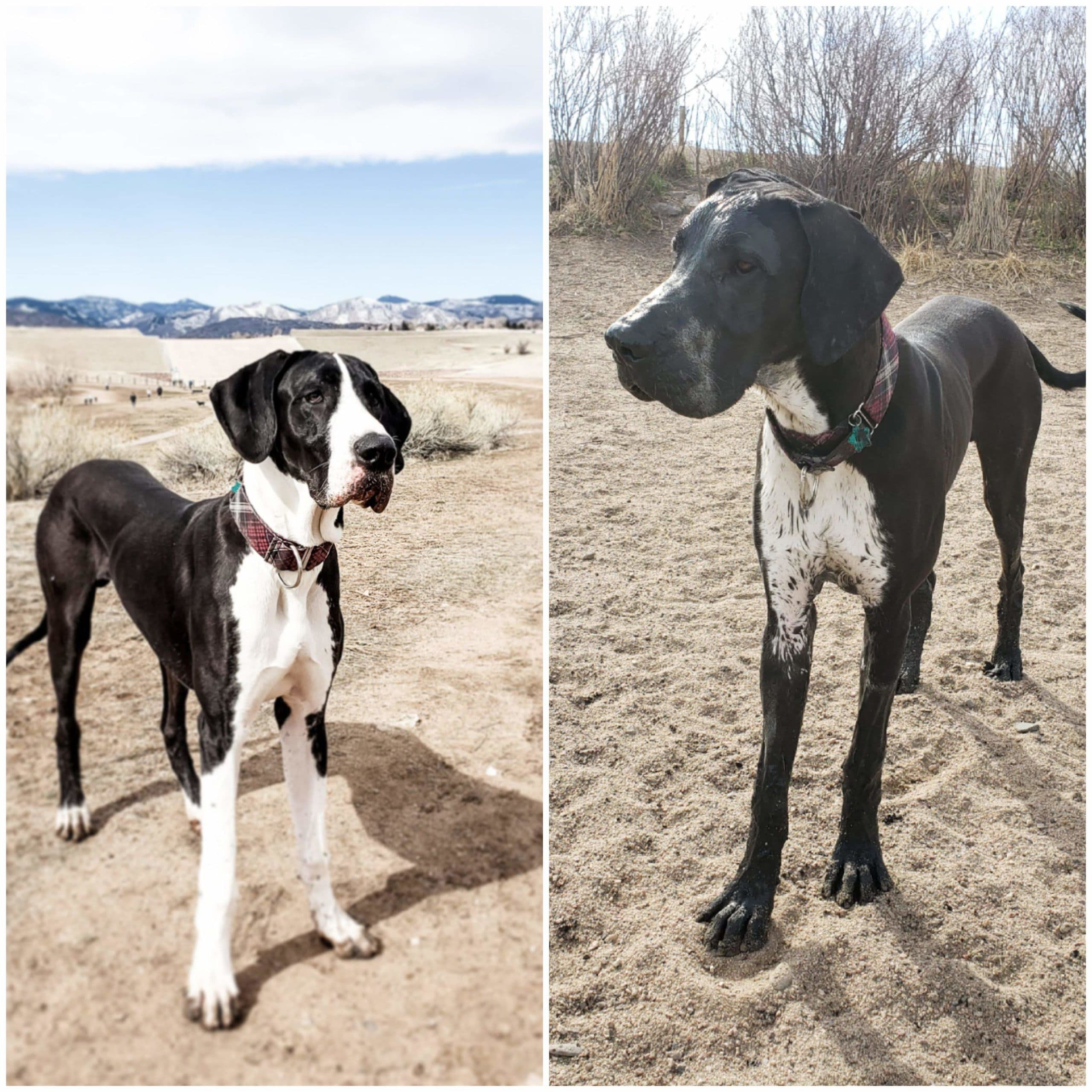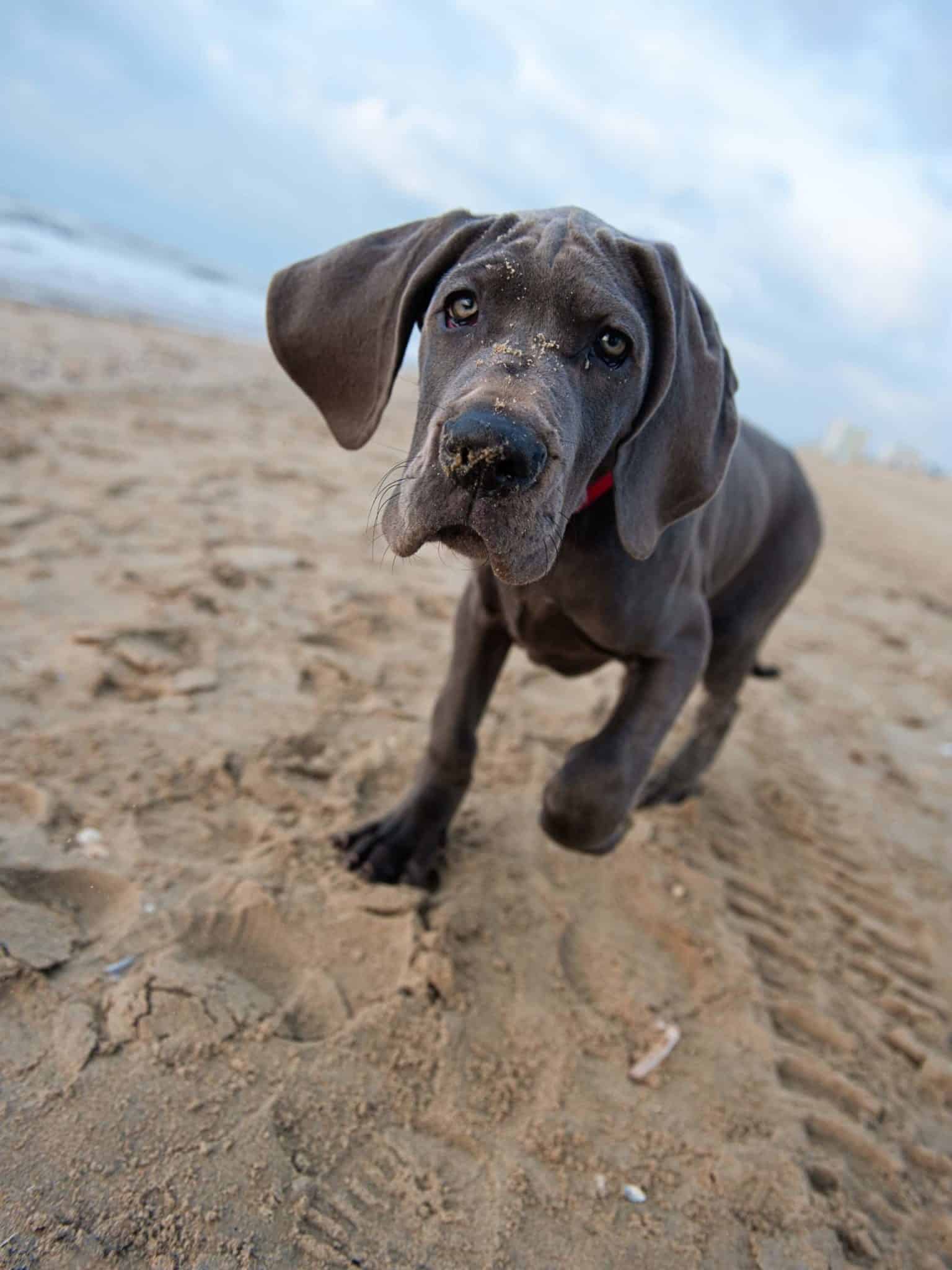Great Dane breed characteristics. Here it is. The no holds barred, honest-to-goodness truth about Great Danes!
What is it like to live with a Great Dane?
What is a Great Dane like?
Are Great Danes aggressive?
How much do they really eat? Can you tell me about the POOP? It’s a lot, right?

GREAT DANE BREED CHARACTERISTICS
From energetic to lazy, drooly to lap dogs, Great Dane’s characteristics can vary so greatly. The important things you need to know about a Great Dane are its energy levels, size, temperament, trainability, and all about food/poop.
Let’s dive in!
GREAT DANE ENERGY
Great Danes are not active in the way that many working, herding or terrier breeds are. However, that doesn’t mean that they are happy to lounge and do nothing 7 days a week!
They are giant dogs that still require exercise and mental enrichment. Lacking an appropriate outlet for their energy, they can quickly destroy a couch and drive you nuts with bouncing, whining, jumping and escaping.
Trick training, basic obedience training, scent work, free play/exploration, and dog sports are great ways to make sure a Great Dane is living the best life possible.

GREAT DANE SIZE
It’s no secret that Great Danes are HUGE dogs! Those of us who live with them are so used to their size that we forget how ridiculous it must look to ‘outsiders’.
Great Danes can be anywhere from 100-200lbs. If you measure from the floor to their shoulder, they will be anywhere from 30-38″ in height.
This does make them large and powerful dogs, however they can be incredibly gentle and fit into some surprisingly small spaces (including RV’s and yes, your LAP!).
It is extremely important that they be kept lean and fit; when a Great Dane is allowed to become heavy, or is bred incorrectly to be ‘oversized’ or ‘exaggerated’, it is extremely hard on their joints and overall health.

GREAT DANE TEMPERAMENT
A well-tempered Great Dane is an absolute joy.
They are playful and can be very silly.
It seems as though they understand English and many of them love to ‘talk’ back in full sentences.
As a general rule Great Danes are friendly, loving and should be courageous, steadfast and gentle.
Most are exceptionally wonderful with children and are fine being around other dogs.
They do require training to become the best dog they can be.
As with any dog: bored, neglected, untrained, under-socialized, unhealthy (painful or having another disorder), and/or poorly bred Great Danes may have faults in their temperament.
We highly recommend consulting with a veterinarian and highly qualified behaviorist if your Great Dane is exhibiting extreme fear or any kind of aggression. Great Danes may be protective, but they should never be nippy, or dangerous.

GREAT DANE TRAINABILITY
Great Danes are very trainable and many absolutely love to work for food.
A well socialized and properly bred Great Dane will be easy to train, but this doesn’t negate the need for consistency, boundaries and lots of teaching.
An untrained, under-socialized Great Dane can be pushy, rude, jumpy, and may steal food, bark too much, run out of doors and pull on a leash.
It is important to start early and work on the basics often! We recommend thoroughly teaching leash skills, come, sit, down, stand, stay, leave it, drop it, off, wait, shhhh, touch and place (go to mat/settle).

GREAT DANE FOOD & POOP
Yes, Great Danes eat more than most dogs.
More food = more poop. But seriously, is that really so bad? It’s bigger piles, not more piles.
Great Danes do require a holistic diet and specific formulations. They are not a dog that you can feed any old food to! Read our blog post on the Best Food for Great Danes here.
Danes are prone to a condition called bloat where the stomach fills up with gas, fluid, food or air and may twist on itself. This is a life threatening emergency that is notably correlated to anxiety, genetics and gut health.
Ethical breeding practices, robust gut health and the correct diet may be the key towards greatly minimizing bloat risk.

Are you interested in welcoming a Great Dane to your family? There are a few more key things to be aware of before you commit!
- Great Danes come with bigger vet bills.
- Great Danes must be highly trained. They require owners that are willing to teach. An untrained Dane is a dangerous Dane; they can pull hard or become rude, jumpy and destructive.
- Many homeowners insurance companies will not insure a home with a Great Dane in it. Check your policy.
- A lot of people are afraid of giant breed dogs. A friendly Great Dane may be seen as a threat by some people. It is important that your Great Dane is able to quickly and confidently change course when approaching somebody who may not be receptive.
- Great Dane puppies have no clue that they have four legs or that their tail is attached. They are CLUMSY and may be more prone to accidentally hurting children or other dogs.
- Heart, blood, thyroid, and joint disorders are common.

YES, GREAT DANES…
- Counter surf (steal food from counters)
- Fart (though, excess gas should be addressed)
- Take up a LOT of room on the couch, the bed, and in the car.
- Have NO clue how big they are!
We are clearly biased over here and think Great Danes are the best! We’d love to hear from you! Do you have a Great Dane? Do you want one? Leave a friendly comment below.
READ MORE:
The Best Crates For a Great Dane

Leave a Reply